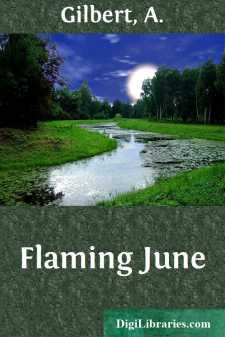Categories
- Antiques & Collectibles 13
- Architecture 36
- Art 48
- Bibles 22
- Biography & Autobiography 813
- Body, Mind & Spirit 142
- Business & Economics 28
- Children's Books 16
- Children's Fiction 13
- Computers 4
- Cooking 94
- Crafts & Hobbies 4
- Drama 346
- Education 46
- Family & Relationships 57
- Fiction 11829
- Games 19
- Gardening 17
- Health & Fitness 34
- History 1377
- House & Home 1
- Humor 147
- Juvenile Fiction 1873
- Juvenile Nonfiction 202
- Language Arts & Disciplines 88
- Law 16
- Literary Collections 686
- Literary Criticism 179
- Mathematics 13
- Medical 41
- Music 40
- Nature 179
- Non-Classifiable 1768
- Performing Arts 7
- Periodicals 1453
- Philosophy 64
- Photography 2
- Poetry 896
- Political Science 203
- Psychology 42
- Reference 154
- Religion 513
- Science 126
- Self-Help 84
- Social Science 81
- Sports & Recreation 34
- Study Aids 3
- Technology & Engineering 59
- Transportation 23
- Travel 463
- True Crime 29
Flaming June
by: A. Gilbert
Description:
Excerpt
Chapter One.
Somewhere on the West coast of England, about a hundred miles from the metropolis, there stands a sleepy little town, which possesses no special activity nor beauty to justify its existence. People live in it for reasons of their own. The people who do not live in it wonder for what reasons, but attain no better solution of the mystery than the statement that the air is very fine. “We have such bracing air!” says the resident, as proudly as if that said air were his special invention and property. Certain West-country doctors affect Norton-on-Sea for patients in need of restful change, and their melancholy advent justifies the existence of the great hotel on the esplanade, and the row of bath-chairs at the corner. There are ten bath-chairs in all, and on sunny days ten crumpled-looking old ladies can generally be seen sitting inside their canopies, trundling slowly along the esplanade, accompanied by a paid companion, dressed in black and looking sorry for herself. Occasionally on Saturdays and Sundays a pretty daughter, or a tall son takes the companion’s place, but as sure as Monday arrives they disappear into space. One can imagine that one hears them bidding their farewells—“So glad to see you getting on so well, mother dear! I positively must rush back to town to attend to a hundred duties. It’s a comfort to feel that you are so well placed. Miss Biggs is a treasure, and this air is so bracing!...”
The esplanade consists of four rows of lodging-houses and two hotels, in front of which is a strip of grass, on which a band plays twice a week during the summer months, and the school-children twice a day all the year long. The invalids in the hotel object to the children and make unsuccessful attempts to banish them from their pitch, and the children in their turn regard the invalids with frank disdain, and make audible and uncomplimentary surmises as to the nature of their complaints as the procession of chairs trundles by.
In front of the green, and separating it from the steep, pebbly shore, are a number of fishermen’s shanties, bathing machines, and hulks of old vessels stretched in a long, straggling row, while one larger shed stands back from the rest, labelled “Lifeboat” in large white letters.
Parallel with the esplanade runs the High Street, a narrow thoroughfare showing shops crowded with the useless little articles which are supposed to prove irresistibly attractive to visitors to the seaside. At the bazaar a big white label proclaims that everything in the window is to be sold at the astounding price of “eleven-three,” and the purchaser is free to make his choice from such treasures as work-boxes lined in crimson plush, and covered with a massed pattern in shells; desks fitted with all the implements for writing, scent bottles tied with blue ribbons; packets of stationery with local views, photograph frames in plush and gelatine, or to select more perishable trophies in glass and china, all solemnly guaranteed to be worth double the price....


